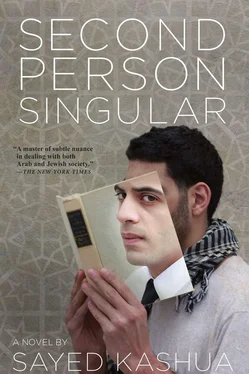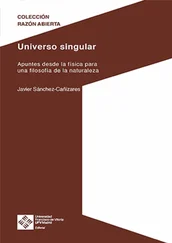I had to go down to Jaljulia. “Um-Bassem’s days are numbered,” my mother had blubbered over the phone the last time we talked. “It would be a disgrace if you didn’t come and say good-bye to her.”
The landlord, the one I called siti, or grandmother, her condition had been worsening throughout the year. She did not have any specific disease but she had lost her hearing and then her sight and her connection to the world around her had begun to deteriorate.
“I recognize your smell,” she said to me the last time I saw her, and her daughters were astonished that she could recognize me and not them or her grandchildren.
She kissed me, as always, and then said, “I saw you last night, you were with them, right? The soldiers. An army on horseback, planes in the sky. They flew right past my eyes.” She pointed ahead. “And I waved to them and said, may Allah be with you, may Allah be with you, and I gave them water and food.” Since then I had been back to the village twice and, despite my mother’s attempts to guilt and wheedle me into going, I had not been to see um-Bassem.
In less than ten minutes we had our seven passengers in the Transporter. Since all the rest of the passengers were women and kids, I sat next to the driver. I remembered that he who rode shotgun was, by convention, also the cashier. The ride from Petach Tikva to Jaljulia costs fifteen shekels and I started to collect the money and distribute the change. In the end I handed the driver ninety shekels in bills and coins.
“Who hasn’t paid yet?” the driver asked, looking in his rearview mirror toward the backseat.
“He’s a little kid,” an old woman in a colorful head scarf said, pointing to a child of four or so, apparently her grandson.
“Ma’am,” the driver said impatiently, “little, big, I don’t care. Is he sitting on a seat or not?”
“Fine,” she said, pulling the child toward her, “now he’s on my lap.”
“You see what I have to deal with,” the driver muttered in my direction. “That’s illegal, ma’am, the child needs to be strapped in. He can’t ride like that. You’re holding us all up and everyone’s in a rush.”
“But he’s just a child,” the woman said.
The driver cut the engine and folded his arms across his chest. “Really? Did you know that a child with no seatbelt is a one-thousand-shekel ticket? Where am I going to get one thousand shekels to pay the state of Israel? There’s a patrol car parked right at the entrance to the village.”
Slowly, so that no one but the driver saw, I slid two coins into the plastic ashtray. The driver looked at me, started the car, and mumbled, “ La hawal, wa la kuwa, ila b’Allah .” Neither by might, nor by strength, but by God. “These people, they come from their holes in the West Bank and they dump all their troubles on us, as if we didn’t have enough of our own. Ma’am, do me a favor, put the kid back in his seat and strap him in tight, okay?”
Oh, how I hated the drive from Petach Tikva to Jaljulia. The sharp smells filtered into my nostrils and spread through my entire body. The scent of bad and irrepressible memories. A scent that only intensified as we approached Jaljulia.
“You from the village?” I heard the driver ask, and when I realized he was talking to me I needed a moment to situate myself in my own life story.
“No,” I heard myself say, offering a different, but also true, version of my life. “I’m from Tira.”
“Ah, from Tira, great people,” the driver said quietly, a smile spreading across his face. “ Yáani one of us. I said to myself, he looks a little different, but he’s got a good face. I said to myself, no way he’s part of that garbage they’re always dumping on us from the Territories.”
“No,” I said, “I’m not from the Territories.”
“They dumped a lot of collaborators on Tira, too, no?”
“So I hear.”
“It’s just unbelievable. I’m telling you, they’ve destroyed our villages. These days a man has to worry about letting his kids out of the house after dark, all because of them. The guns, the drugs, the whores, it’s all them. And the police? Nothing. What do they care? As far as they’re concerned they can turn our villages into hell, they don’t care. Best I can tell it’s exactly what they want.”
“Yeah,” I said to the driver, who was looking in his rearview mirror to make sure that his words hadn’t been heard by the wrong pair of ears. “Do you have your ID with you?” he asked all of a sudden.
“What? Yes, why?” I asked, nervous, and the driver pointed ahead with his chin toward the traffic cop and the blinking light-stick he was flicking toward the side of the road. “Looking for illegals.”
“How you doing tonight?” the officer asked the driver through the window.
“ Walla, thank God,” the driver said, smiling. “As you see, working.”
The policeman looked the passengers over and, seeing that it was all women and children, turned to me and asked for my ID. I looked around in my bag and pulled out the right set of papers.
“You have a good night,” the policeman said to the driver, sending us off with a raised and blinking wand of light.
“ Kus okhtuk,” the driver mumbled, cursing his sister’s cunt. “Fucking Druze piece of shit.”
PRAYER FOR THE DEAD
“Oh,” Ruchaleh said, taking off her glasses, placing her book in her lap, and straightening up on the couch. “You’re home early.” Before setting off for Jaljulia I told her that I would be leaving right after my shift on Thursday and that I wouldn’t be back until Saturday night. She’d booked a different caretaker, the same one she used when we went out, usually on Thursday nights, for a movie and dinner.
“Yeah,” I mumbled. “Got back early.”
Recognizing that now was not the time for her usual cynicism, she sounded concerned when she asked, “What happened? You look wrecked.”
“How’s Yonatan?”
“Fine, fine. Sit down.”
I took a deep breath, put my bag on the floor, and sat on the couch, head down.
“What happened?” she asked again, and all I did was shake my head slowly and snort.
“You want a drink?” she asked, picking up a bottle of red wine. I nodded and she went to the kitchen for another glass.
“You don’t want to tell me what happened?”
“Um-Bassem died,” I said, and I filled my mouth with wine.
Um-Bassem died. I knew it as soon as I got out of the share-taxi. There was no doubt. There were men milling around the street, looking for a rock or something to perch on, men obviously called from work for a funeral. From a distance I could still recognize a few of them — the husbands of um-Bassem’s daughters who, despite having grown up, were still recognizable by the way they moved.
I walked toward them with my head down, pretending that I had come as they had, after receiving word.
“Allah have mercy on her,” I said, and shook the hands of a few men in the street. “ Ta’ish,” they said, as was customary. There were only a few dozen men present. The funerals of the elderly draw only kin.
The women’s voices could be heard from within the courtyard but I preferred to stay outside with the men. The separation is very clear in these kinds of affairs — men and women do not mix at all.
“Don’t be embarrassed,” the husband of um-Bassem’s oldest daughter said. “Go on in, put your bag down, wash your face. Don’t be embarrassed, there’s still no one but family in the house, there’s still time.”
“When did she pass?” I asked as I followed him to the house and, like him, I bowed my head and did not look at the women.
“Before dawn,” he said, looking at his watch. “But we waited for Bassem, may God help him. We’ve been telling him for a week to come immediately and say good-bye, but he hasn’t. What kind of job is it that keeps you from parting with your own mother? He just got here a second ago from the airport.”
Читать дальше












